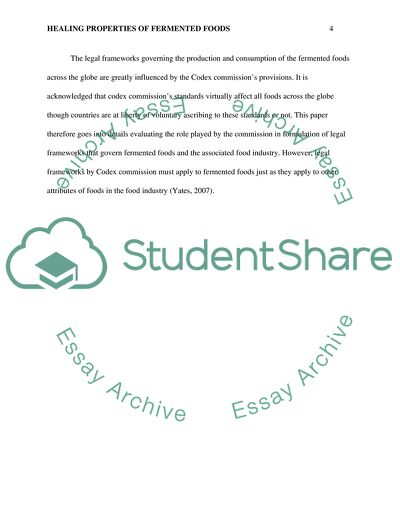
- Home
- Free Samples
- Premium Essays
- Editing Services
- Extra Tools
- Essay Writing Help
- About Us
- Studentshare
- Subjects
- Law
- Legislation: Healing Properties of Fermented Foods
Legislation: Healing Properties of Fermented Foods - Essay Example

- Subject: Law
- Type: Essay
- Level: Undergraduate
- Pages: 26 (6500 words)
- Downloads: 0
- Author: filomena60
Extract of sample "Legislation: Healing Properties of Fermented Foods"
The foods attract appreciation from people due to their longer preservation capacity, great tastes, and flavors as well as notable nutritional and medicinal values. Besides, fermented foods are acknowledged for maintaining wholesomeness and thus attributed to improved digestion for human beings (Wang, Zhang, Zhao, & Xu, 2008). The consumption of fermented food, either intentionally for the benefits to be derived from them or unintentionally as food would ferment during preservation has been a common phenomenon within all human societies. It is estimated that merely all human societies had one form or another of fermenting food for consumption as well as for preservation. It is also notable that many modern-day societies acknowledge the consumption of fermented foods, especially for the many benefits that they derive. Therefore, many benefits are seen to emanate from taking fermented foods by human beings.
First, fermentation is a great method of preserving food instead of the use of such mechanisms as canning and refrigeration (Lemon, 2011). Agricultural producers would exploit this advantage in preserving farm produce through fermenting and in the process minimize costs in handling and preservation of the same. Fermentation of foods has direct benefits for human beings in that as earlier alluded to, the gut or the digestive systems of human beings harbors many bacteria (Qiao, Sun, Ding, Le & Shi, 2013).
It is the finding of the paper that though fermented foods are associated with many benefits and are highly esteemed culturally, it has associated health benefits and this explains the medicinal attributes associated with them. The legal frameworks governing the production and consumption of fermented foods across the globe are greatly influenced by the Codex commission’s provisions. It is acknowledged that the codex commission’s standards virtually affect all foods across the globe though countries are at liberty to voluntarily ascribe to these standards or not.
CHECK THESE SAMPLES OF Legislation: Healing Properties of Fermented Foods
Consumer Purchasing and the Rehabilitation Industry
Human Rights and Natural Law: Facts and Correlation
The South Korean Chaebol System
The Facts of the Case Salomon versus Salomon
Bioreactors and Fermentation for Chemical Engineers: fermenters and their operation
Bioreactors and Fermentation for Chemical Engineers: fermenters and their operation
Sterilizable Fluidized Bed Fermenter
Main Aspects of Employment Policy for People with Disability in Saudi Arabia

- TERMS & CONDITIONS
- PRIVACY POLICY
- COOKIES POLICY